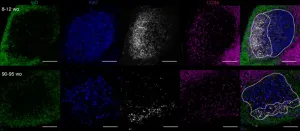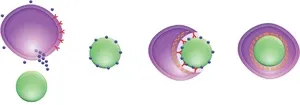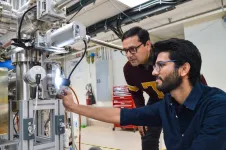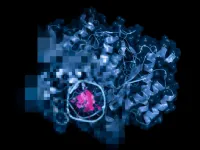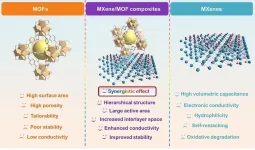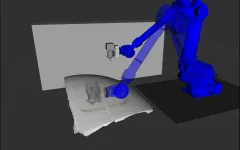(Press-News.org) Understanding the ways our immune response changes as we age holds the key to designing better vaccines and boosting protection for people most at risk. Research published by Dr Michelle Linterman and her group today in Nature Immunology has explained that the organisation of the germinal centre, which is vital to the generation of longer-lived protection following vaccination, is altered in ageing. By demonstrating that these age-related changes can be reversed in mice, the research sets the foundation for interventions that bolster an effective vaccine response.
After a vaccination our immune system reacts by creating specialised structures called germinal centres that produce the immune cells (B cells) that provide long-term protection through the production of antibodies. Due to an age-dependent impairment in antibody production, older people have lower levels of protection from vaccination which also wanes more quickly compared to younger people. Protection by vaccination is essential to protect older people who become more susceptible to infections with age. Therefore, understanding how the age-related decline of the immune system can be reversed or mitigated is an important part of securing better health in later years.
The correct function of the germinal centre response requires the coordination of cellular interactions across time and space. Germinal centres are made up of two distinct regions – the light zone and dark zone, with some cells located in specific areas, and others which move between the zones. B cells are shaped by their interactions in first the dark zone and then in the light zone.
Through a combination of mouse research, computer modelling and analysis of human vaccination data, the Linterman lab research team were able to show that changes to key interactors of B cells in the light zone of the germinal centre, T follicular helper cells, and also to light-zone specific cells called follicular dendritic cells (FDCs), were at the heart of the diminished vaccination response.
Dr Michelle Linterman, a group leader in the Institute’s Immunology programme, explains “In this study we looked at what was happening to different cell types in the germinal centre, particularly the structure and organisation of the germinal centre across its two functionally distinct zones, to try and understand what causes the reduced germinal centre response with age.
"What we found is that the T follicular helper cells aren’t where they should be and as a result, antibody-producing cells lose essential selection cues. Surprisingly we also uncovered an unknown role for T follicular helper cells in supporting the expansion of follicular dendritic cells in the light zone after vaccination."
The team used 3D computer modelling to simulate the loss of Tfh cells from the light zone and a reduced FDC network, which recapitulate their findings and strengthened their hypothesis that these two factors were enough to be responsible for a suboptimal germinal centre response in aged mice.
Having identified the dependencies between the cell types, the researchers used genetically modified mice to control the location of Tfh cells in the germinal centre, demonstrating that the defective FDC response was caused by loss of Tfh from the light zone. Importantly, they were also able to correct the defective FDC response and boost the germinal centre response in aged mice by providing T cells that could correctly localise to the light zone.
The team also utilised data from human vaccination studies and found similar age-dependent changes in mice and humans.
“These findings give us a more complete picture of what the effects of age are on the germinal centre and vital insight into how we might address these in terms of developing effective strategies for enhancing vaccine response in older people” concluded Dr Linterman.
END
'Lost' immune cells partly to blame for reduced vaccine response in older people
Consequences of cells not being in the right place at the right time lead to immune system defects.
2023-05-22
ELSE PRESS RELEASES FROM THIS DATE:
Stretching metals at the atomic level allows researchers to create important materials for quantum, electronic, and spintronic applications
2023-05-22
A University of Minnesota Twin Cities-led team has developed a first-of-its-kind, breakthrough method that makes it easier to create high-quality metal oxide thin films out of “stubborn” metals that have historically been difficult to synthesize in an atomically precise manner. This research paves the way for scientists to develop better materials for various next-generation applications including quantum computing, microelectronics, sensors, and energy catalysis.
The researchers’ paper is published in Nature Nanotechnology, ...
AI predicts the function of enzymes
2023-05-22
Enzymes are the molecule factories in biological cells. However, which basic molecular building blocks they use to assemble target molecules is often unknown and difficult to measure. An international team including bioinformaticians from Heinrich Heine University Düsseldorf (HHU) has now taken an important step forward in this regard: Their AI method predicts with a high degree of accuracy whether an enzyme can work with a specific substrate. They now present their results in the scientific journal Nature Communications.
Enzymes are important biocatalysts in all living cells: They facilitate chemical reactions, through which all molecules ...
Video games and education: five steps for choosing the perfect classroom game
2023-05-22
Minecraft is officially the most played video game in history. Despite been 12 years old, the public does not seem to have lost interest: over 175 million people play Minecraft at least once a month. The number of players of this open-world or sandbox building game, which provides virtually unlimited possibilities for creation, keeps growing, and this is to a great extent thanks to its educational potential. According to Microsoft data, Minecraft Education Edition has over 35 million game licences. And this is just one of the many ways in which it can be ...
Ukraine hospital improving emergency cardiovascular care during national crisis
2023-05-22
The Clinical Hospital of Emergency Services, a municipal hospital serving the community of Dnipro, in Ukraine, is the first in the country to take part in the American College of Cardiology’s Global Quality Solutions program. The hospital joins the program in an effort to improve heart attack care by reducing heart attack related deaths and saving lives in their community.
“When the war started, myself and others on my team decided to stay at work to do our best to help our people, soldiers, neighbors and relatives to survive. But we decided it was not enough to only maintain, but that ...
Metal−organic frameworks meet MXene: New opportunities for electrochemical application
2023-05-22
They published their work in Energy Material Advances.
"The investigation of MXene/MOF hybrid materials with high electrochemical performance is important," said paper author Huan Pang, professor with the School of Chemistry and Chemical Engineering, Yangzhou University. "Currently, MXene/MOF hybrid materials have received increasing attention in energy-related fields."
Pang explained the motivations for designing MXene/MOF hybrid materials. Firstly, MXenes with numerous negatively charged surface groups can be employed as a valid substrate to support the growth of MOFs, thus not ...
A guide through the genome
2023-05-22
Plants show enormous variety in traits relevant to breeding, such as plant height, yield and resistance to pests. One of the greatest challenges in modern plant research is to identify the differences in genetic information that are responsible for this variation. A research team led by the "Crop Yield" working group at the Institute for Molecular Physiology at Heinrich Heine University Düsseldorf (HHU) and the Carnegie Institution of Science at Stanford has now developed a method to identify precisely these special differences in genetic information. Using the example of maize, they demonstrate the great potential of their method in the journal Genome Biology and present ...
How plants use sugar to produce roots
2023-05-22
Along with sugar reallocation, a basic molecular mechanism within plants controls the formation of new lateral roots. An international team of plant biologists has demonstrated that it is based on the activity of a certain factor, the target of rapamycin (TOR) protein. A better understanding of the processes that regulate root branching at the molecular level could contribute to improving plant growth and therefore crop yields, according to research team leader Prof. Dr Alexis Maizel of the Centre for Organismal Studies at Heidelberg University.
Good root growth ensures that plants can absorb sufficient ...
Dirty air linked with premature death in patients with heart failure
2023-05-22
Prague, Czechia – 22 May 2023: Heart failure patients are at increased risk of dying from their condition on polluted days and up to two days afterwards, according to research presented today at Heart Failure 2023, a scientific congress of the European Society of Cardiology (ESC).1
“The findings indicate that reducing air pollution has the potential to prevent worsening heart failure,” said study author Dr. Lukasz Kuzma of the Medical University of Bialystok, Poland. “Protecting ...
Eu3+-Bi3+ codoping double perovskites for single-component white-light-emitting diodes
2023-05-22
They published their work on May. 15 in Energy Material Advances.
"With lead-halide perovskites reaching a mature research stage approaching product marketing, concerns remain about the materials' stability and the toxicity of lead-based salts." said paper author Hongwei Song, professor at College of Electronic Science and Engineering, Jilin University. Double perovskites with Cs2AgInCl6 composition, often doped with various elements, have been in the spotlight owing to their intriguing optical properties, namely, ...
ROS-Industrial Americas Consortium celebrates 10th annual meeting at Automate 2023
2023-05-22
San Antonio, Texas – May 22 ,2023 – The ROS-Industrial Americas Consortium, a project dedicated to advancing open-source robotics for manufacturing and industry, will celebrate its 10th anniversary on May 25 at its annual meeting in Detroit.
The event will correspond with the Automate 2023 show, the largest automation showcase in North America, creating an exciting atmosphere for ROS-Industrial members to reflect on the organization’s history while also setting the stage for innovation in the years to come.
The ROS-Industrial open-source project began as a collaboration among Yaskawa Motoman Robotics, Southwest Research Institute ...
LAST 30 PRESS RELEASES:
Black soldier fly larvae show promise for safe organic waste removal
People with COPD commonly misuse medications
How periodontitis-linked bacteria accelerate osteoporosis-like bone loss through the gut
Understanding how cells take up and use isolated ‘powerhouses’ to restore energy function
Ten-point plan to deliver climate education unveiled by experts
Team led by UC San Diego researchers selected for prestigious global cancer prize
Study: Reported crop yield gains from breeding may be overstated
Stem cells from human baby teeth show promise for treating cerebral palsy
Chimps’ love for crystals could help us understand our own ancestors’ fascination with these stones
Vaginal estrogen therapy not linked to cancer recurrence in survivors of endometrial cancer
How estrogen helps protect women from high blood pressure
Breaking the efficiency barrier: Researchers propose multi-stage solar system to harness the full spectrum
A new name, a new beginning: Building a green energy future together
From algorithms to atoms: How artificial intelligence is accelerating the discovery of next-generation energy materials
Loneliness linked to fear of embarrassment: teen research
New MOH–NUS Fellowship launched to strengthen everyday ethics in Singapore’s healthcare sector
Sungkyunkwan University researchers develop next-generation transparent electrode without rare metal indium
What's going on inside quantum computers?: New method simplifies process tomography
This ancient plant-eater had a twisted jaw and sideways-facing teeth
Jackdaw chicks listen to adults to learn about predators
Toxic algal bloom has taken a heavy toll on mental health
Beyond silicon: SKKU team presents Indium Selenide roadmap for ultra-low-power AI and quantum computing
Sugar comforts newborn babies during painful procedures
Pollen exposure linked to poorer exam results taken at the end of secondary school
7 hours 18 mins may be optimal sleep length for avoiding type 2 diabetes precursor
Around 6 deaths a year linked to clubbing in the UK
Children’s development set back years by Covid lockdowns, study reveals
Four decades of data give unique insight into the Sun’s inner life
Urban trees can absorb more CO₂ than cars emit during summer
Fund for Science and Technology awards $15 million to Scripps Oceanography
[Press-News.org] 'Lost' immune cells partly to blame for reduced vaccine response in older peopleConsequences of cells not being in the right place at the right time lead to immune system defects.
